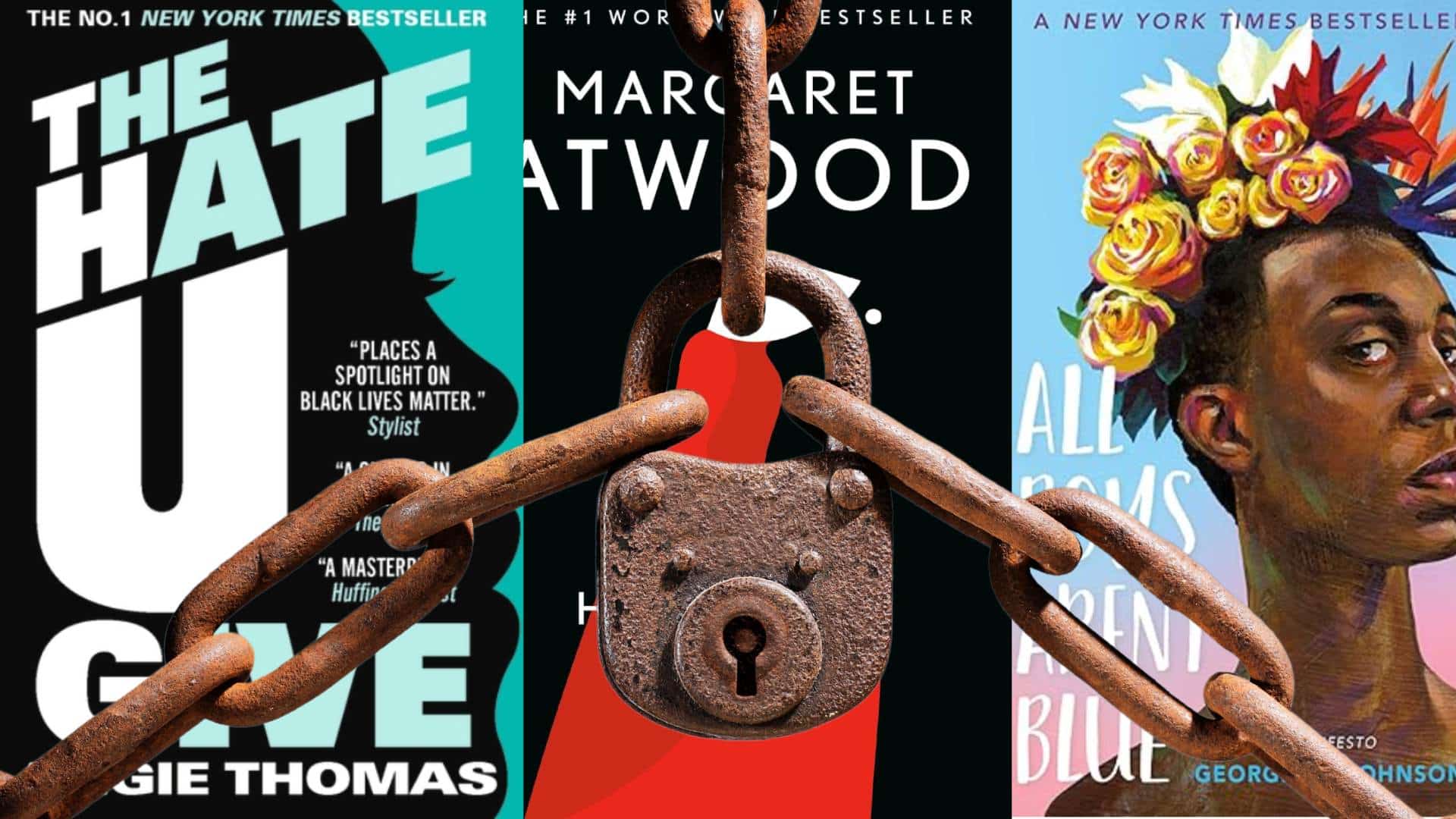In more regions around the world people want to keep some books out of the hands of youth. But these are the books that engage kids the most.

A heavy chain and lock covers three novels at the heart of book banning controversies. (Illustration by News Decoder)
This article, by high school student Emily Ireland, was produced out of News Decoder’s school partnership program. Emily is a student at St. Andrew’s Episcopal School in the United States, a News Decoder partner institution. Learn more about how News Decoder can work with your school.
St. Andrew’s Episcopal School prides itself on the freedom and opportunity to learn, even about controversial and hard topics. It is located in the city of Jackson in the U.S. state of Mississippi. However, that is not the case for other schools in Mississippi or nationwide.
An epidemic of book banning is impacting children’s curiosity and right to learn.
In communities all over the world, some books are banned in public schools and libraries because the content is considered insensitive or inappropriate.
Public schools in Madison County in Mississippi, for example, removed The Hate You Give by Angie Thomas due to its content on racial issues and police brutality.
While The Hate You Give is fiction, many readers share the same experiences and hardships Thomas wrote about. Banning books that talk about violence, although very real in our current society, is controversial.
“If you live it,” said Anabelle Abraham, a student at St. Andrews, “you should be able to read about it.”
Some regions are more limiting than others.
While book bans are national issues, they are especially prevalent in the southern part of the United States. According to a study by PEN America, an organization that advocates for free speech, of the more than 3,300 books that were banned across the United States in the 2022–23 school year, 40% occurred in Florida, with another 19% in Texas.
Nearly half of the public school districts in Florida were subject to book bans in that school year.
The bans in Florida that year might have been in anticipation of the passage of Florida’s House Bill 1069 in July 2023, a law that restricts books with content on gender and sexual orientation for elementary school students.
Books banned in Florida as a result of the law include the following: The World Book Encyclopedia, 100 Women Who Made History: Remarkable Women Who Shaped Our World and Africa (Cultural Atlas for Young People).
In May 2023, PEN America, along with families, authors and the publisher Penguin Random House sued Escambia County School District and school board arguing that book bans violate the rights of students under the free speech provisions of the First Amendment to the U.S. Constitution.
The school board argued that the bans don’t prevent people from personally owning banned books. This kind of argument does not just occur in Florida but in many other states including Iowa and Texas.
Bans across borders
Book bans are not just a national problem, but rather a global one. Countries as diverse as China, Iran and Denmark are also banning books for different reasons.
According to the Reuters newswire service, in post-COVID China, there has been a movement to remove books deemed “politically incorrect.” This stems from the government’s fear of ideas deemed unpatriotic and that question the ideology of the ruling communist party.
Censorship has increased under Chinese President Xi Jinping’s administration, and the banning of hundreds of thousands of books proves that. Similarly, in Iran, within the last two years, books have either been published in expunged versions or taken off shelves altogether.
According to the Los Angeles Times, the idea behind this movement is to prevent a Western culture invasion. Because of this censorship, writers living in and outside of Iran have been trying to smuggle banned books across the border to eager readers.
Reasons books are feared differ.
Denmark is dealing with a different book-related crisis; crowds of people hostile to immigration burning Islam’s holy text, the Quran. According to The Courthouse News Service, the Danish government is currently trying to gather “legal tools” to prevent such riots.
In the United States, Margaret Atwood’s The Handmaid’s Tale is a controversial book that has been banned in many states due to its content on religion, women’s rights, violence, sex and explicit language.
However, in a classroom setting where the novel is analyzed, it can be seen as much more than a book unfit for consumption; rather, it teaches lessons on a multitude of themes, such as the importance of identity and freedom.
Earlier in the year, students in their last year of high school at St. Andrew’s read this very book in a class taught by English teacher Paul Smith.
“There were all the reasons to teach [The Handmaid’s Tale] and none of the reasons not to,” Smith said. “It’s a compelling piece of literature, not without flaws. It’s a great read, more relevant now than ever because we see so many threats to freedom of expression, bodily autonomy and the rights of women. I think it’s timely, engaging, a great read and a wonderful text to deal with.”
Access to a book matters.
Allowing students to dive into a book like The Handmaid’s Tale that deals with so many relevant issues is important.
It is important to let students make their own informed opinions on topics using critical thinking skills, said St. Andrew’s librarian Tonja Johnson.
“If we don’t present different viewpoints, and we only present one particular viewpoint, we’re not asking students to do any thinking, we’re just asking them to accept a general truth or the truth as we believe it, or as the publishers of one particular book believe it to be,” Johnson said. “So if we really want to make those educated decisions, and we really want students to be able to think thoughtfully about controversial topics or debatable topics, they have to have all of the information. They have to see it from different viewpoints.”
Book bans can negatively affect a child’s sense of belonging. According to Mississippi Public Broadcasting, the majority of bans in that state target books featuring themes of gender or sexual identity, racial inequality or that include depictions of violence and sexual experiences.
St. Andrew’s, the school that Annabel Abraham and I both attend, welcomes diversity. Its student body include those who identify as LGBTQ+, those who speak different languages and are from different races and cultures.
People see themselves in stories.
In the St. Andrews community, it is important to provide students who may feel different or excluded with books that make them feel accepted.
“Certain groups are being targeted [through book bans], and it’s sending a message to those students in particular, that they don’t belong and that their story doesn’t matter and it’s a way of making people feel less than and nobody should be made to feel that way,” Johnson said. “Everybody’s story matters, and it’s important that we see that we’re not all the same.” Realizing and accepting our differences in the St. Andrews community brings us together, and reading books about people’s differences is one way to do that.
Some books might not be appropriate for all age levels, but introducing high school students to difficult concepts is how they learn and ultimately shapes them into who they become.
“If [book bans are] effective, some students will never get to experience that life-changing book,” Smith said. “I’ve been doing this for 34 years now. I’ve seen over and over again how well a single book can transform a student: wipe away some prejudices and totally reframe the possibilities of the future, the kid’s life and how they see the world.”
Book bans not only suppress life-changing stories, but they also erase stories that authors wrote for particular audiences. Authors can be inspired to write about something they have struggled with in the past, giving younger generations knowledge they wish they had.
“As a librarian,” Johnson said, “I’ve heard too many people tell me that having access to particular information or a particular story, not only made a difference in their life, but it saved their life.”
Questions to consider:
- Why do some governments implement book bans?
- Do you think there are book topics that should or shouldn’t be banned in public schools and libraries, and why?
- Is there a book you’ve read that has opened your mind to a new way of thinking?

Emily Ireland is a student at St. Andrew’s Episcopal School in Jackson, Mississippi in the United States. The senior copy editor for the journalism team, Ireland is also an avid distance runner and will run cross country and track at Mercer University next year in Macon, Georgia. In her free free time, she enjoys hanging out with friends, eating Mexican food, listening to Taylor Swift and playing with her dog.
Read more News Decoder stories about censorship:
